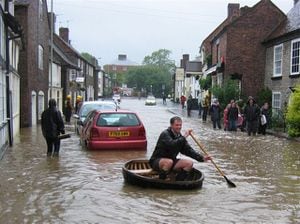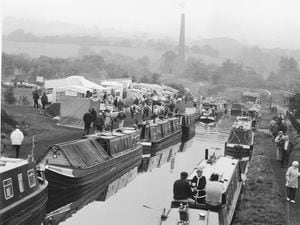Recalling the great floods, 10 years on
Roads submerged, towns sealed off. Bridges swept away in a matter of minutes, the Severn Valley Railway forced to close for nearly a year after the ground was washed away beneath its tracks.

While we might complain about the showers which have interrupted our summer over the past few days, at least we have not had to endure anything like the downpours which engulfed the whole of the Midlands 10 years ago.
Last month was one of the driest on record and, after a blip this weekend, forecasters are promising a heatwave for Shropshire in the coming weeks.
On July 23, 2007, barriers were going up in the Frankwell area of Shrewsbury on July 23,as the latest heavy rain in Wales rushed down the River Severn through the county town.
Shropshire was still mopping up from the floods of a couple of days earlier which had stopped rail services from Shrewsbury to Hereford because the line was under water at Ludlow.
Every shop in Tenbury Wells had been forced to close, while Craven Arms was sealed off after the River Clun burst its banks for the first time in living memory.
Further downstream Bridgnorth was under water and even further south towns like Worcester, Gloucester and particularly Upton were badly hit.
A few weeks earlier Burway Bridge in Ludlow, the town's main route across the River Corve into Ludlow, collapsed under the weight of floodwater, and residents of Lower Corve Street and Coronation Avenue had to be evacuated.
On June 19 the ground beneath the Severn Valley Railway line at Highley had been simply washed away, leading to the need for £4 million in repairs – not to mention a year's loss of earnings as the attraction was forced to close.
In Much Wenlock, town councillor Simon Ross took to his coracle after the High Street became flooded, and the A458 between Bridgnorth and Shrewsbury was closed after a culvert burst its banks.
At Alveley, near Bridgnorth, Ray and Diana Scriven were waiting anxiously for news on their house which was left teetering on the edge of a flooded gorge after a downpour on June 25.
Workmen demolished the conservatory to take weight off the rest of the house.
Mrs Scriven said at the time: "It's like watching your life crumble away. Before, it was a lovely idyllic place with a lovely babbling brook. When I saw the rain on Monday I was beside myself."
Dave Throup from the environment agency spent many days working in the floods and found himself stuck when flash flooding hit the M50.
He said that since the summer of 2007 a great deal had been done to help prevent flooding in the future.
"Ten years ago an innocuous weather system starting forming in France. It moved up from France bringing huge rainfall. It caused devastation in the area. Since there a lot of changes have been made.
"There has been £70 million invested in flood risk management and 32 flood defences built," he said.
He said 4,550 had been better protected and almost 17,000 people now received flood warnings.
From 2010 to 2014, £4.5 million was spent on flood defences in the county, including the £2.4 million Coleham Head flood risk management scheme in Shrewsbury, and £96,000 which was spent on the Ash Brook channel improvements in Church Stretton. A further £75,000 was spent on a flood alleviation scheme in Much Wenlock.
Mr Throup said the Environment Agency and the Met Office now had a shared national weather forecasting centre which could help them anticipate extreme weather conditions earlier and take the necessary measures.





